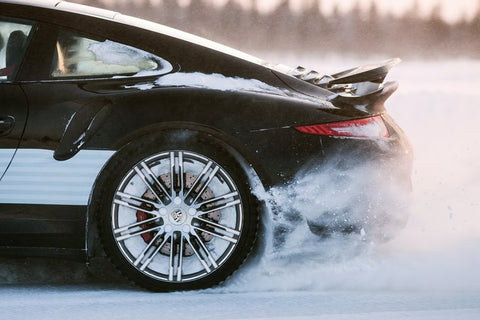Car enthusiasts have always wondered how cold weather affects turbo boosts. Low temperatures have a unique influence on a turbocharger. So, are turbo cars faster in cold weather? Does cold weather impact the acceleration of turbo cars?
This is something worth knowing to understand the relationship between turbocharging and cold weather. Stay tuned to learn the impact of weather conditions on turbo cars!
Are Turbo Cars Faster in Cold Weather?
Turbocharged engines have become increasingly popular in the automotive industry, offering improved power and performance. Yet, many factors contribute to their performance, and the weather is one of them.
So, do turbo cars perform better in cold weather? Usually, turbo cars are faster when it is cold because, in these conditions, the engine produces more power. Understanding how a turbocharger works helps explain why cold weather affects the turbo car acceleration.

Source: shutterstock.com / Photo Contributor: Max Anuchkin
How does a turbocharger work?
A turbocharger is a mechanical device that forces more air into the engine, burning fuel and generating more power. It consists of a turbine and a compressor, both driven by exhaust gases. The turbine is attached to the engine’s exhaust manifold and is driven by the hot gases that come from combustion.
The compressor’s role is to increase the air supplied to the engine. The engine’s exhaust gases drive the compressor and compress the incoming air before it goes to the combustion chamber. This leads to increased power output.
One of the factors that plays an important role here is the temperature. However, the temperature influence may vary based on the car’s model and the turbocharger’s type. There are different turbochargers, from lower-quality to high-quality. You can find a lot of high-quality turbochargers for sale on the market.
But how does cold weather affect the speed of turbo cars? Cold air, being denser than warm air, contains more oxygen molecules per unit volume.
Since combustion requires oxygen, a turbocharged engine benefits from cold air because it allows more fuel to be burned, leading to increased performance. This is why turbocharged engines usually produce more power in cold weather.
Why Do Turbo Cars Perform Better When It Is Cold?
- Cold air is denser than warm air and increases oxygen density, leading to better engine combustion.
- The turbocharger is designed to compress the incoming air before it enters the engine. When cold air is compressed, its density increases even further.
- Turbochargers produce heat during operation. The cold air helps to balance the engine's temperature. Yet, excessive heat may negatively impact the engine's performance and durability.
What Impacts a Turbocharger's Efficiency?
Several factors influence a turbocharger's efficiency. These factors include the engine's RPM, boost pressure, and operating temperature.
While cold weather makes turbo cars faster, extreme winter temperatures can impact the performance of the turbocharger and the engine. Extremely cold weather may lead to the thickening of the turbocharger's oil and increasing internal resistance.
Another factor to consider is the battery. Since very low temperatures can decrease the battery's efficiency, this may lead to lower voltage output. Yet, modern cars have systems that regulate the voltage and ensure optimal performance even in cold weather conditions.
But what is the best temperature for turbo cars? The ideal temperature for turbo cars is between 50 °F and 80 °F. Yet the optimal temperature for turbo cars may vary based on the model of the vehicle and the turbocharger's type.

Source: shutterstock.com / Photo Contributor: Maksim Toome
Conclusion
Are turbo cars faster in cold weather? Indeed, they exhibit enhanced performance in colder weather. Turbos perform better in cool weather because of the higher density of cold air, which leads to greater combustion and increased power output.
Yet, extreme temperatures may cause issues with the overall performance of the engine and turbocharger and battery efficiency. Considering these factors will help you take measures to ensure optimal performance and safety in cold weather.



